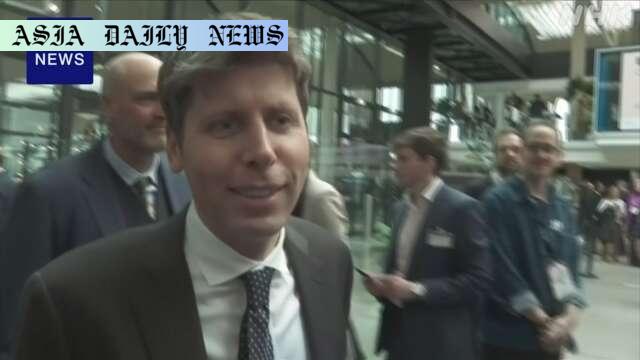OpenAI was reported to be targeted by a takeover bid led by Elon Musk, but CEO Sam Altman firmly stated the company is not for sale.
- OpenAI CEO Sam Altman confirms the company is not for sale.
- Elon Musk was reportedly leading a takeover bid for OpenAI.
- Altman describes the offer as a tactic to disrupt OpenAI.

Introduction
In a significant declaration of independence and purpose, OpenAI CEO Sam Altman made it abundantly clear that the pioneering artificial intelligence company is not for sale, despite reports of a takeover bid led by billionaire entrepreneur Elon Musk. This announcement came during Altman’s appearance at the Artificial Intelligence Action Summit in Paris, where questions of big tech influence and corporate buyouts were prominent themes.
The Origins of the Reported Offer
Speculation around a potential sale of OpenAI surfaced following reports that Elon Musk, a former co-founder and now a critic of OpenAI, was reportedly spearheading an effort to acquire the company through an investment group. Musk’s past connection to OpenAI, combined with his sometimes critical stance on the company’s current direction, added fuel to these rumors. This context led journalists to seek clarity about Altman’s stance on the alleged offer.
Sam Altman’s Firm Response
Altman swiftly dispelled any confusion over his company’s future. When questioned about Musk’s reported offer, Altman dismissed it as “ridiculous,” categorizing the move as one of Musk’s strategies to disrupt OpenAI’s operations. The CEO firmly stated, “The company is not for sale,” reiterating OpenAI’s commitment to their mission rather than financial or ownership changes.
OpenAI’s Mission and Long-Term Vision
OpenAI, best known for its development of ChatGPT and other groundbreaking AI products, positions itself as an organization dedicated to advancing artificial intelligence responsibly and equitably. Altman’s comments underline this vision, emphasizing the company’s focus on innovation rather than profit-driven motives that may accompany acquisition by private entities or tech entrepreneurs. Maintaining independence, as Altman indicated, is critical to upholding its principles.
Elon Musk and OpenAI: A Complex Relationship
Elon Musk’s relationship with OpenAI has been complex and often contentious. As a co-founder, Musk played a pivotal role in the company’s inception, but he parted ways years ago. Since then, Musk has expressed skepticism over some of OpenAI’s practices, particularly concerning its commercialization efforts. This latest reported acquisition attempt, whether serious or speculative, adds another layer to the ongoing narrative between Musk and OpenAI.
Industry Implications
The exchange between Altman and journalists in Paris highlights broader dynamics in the tech industry. As AI technologies grow in both capability and influence, the line between commercial motives and ethical development becomes increasingly significant. OpenAI’s stance underscores the importance of maintaining autonomy in the pursuit of a mission-driven agenda, which could set a precedent for other companies navigating similar pressures.
Conclusion
The firm response from OpenAI CEO Sam Altman serves as a reminder of the company’s dedication to its mission and values. While Elon Musk’s reported takeover bid adds another chapter to their complex relationship, OpenAI’s rejection of such offers underscores its commitment to innovation and ethical considerations. In a rapidly evolving landscape, this decision may prove pivotal in balancing progress and principle in artificial intelligence development.



Commentary
OpenAI’s Bold Stance
OpenAI has taken a bold and admirable stance in the face of a reported takeover bid led by Elon Musk. This situation underscores the pressures that mission-driven organizations face in a highly competitive and profit-centric technology sector. By firmly stating that the company is not for sale, Sam Altman has sent a clear message: OpenAI prioritizes its mission over financial gains or external influence.
The Ethics of Independence
The question of who controls artificial intelligence development is crucial as the technology becomes more integrated into daily life. OpenAI’s decision to push back against a potential acquisition is not merely about retaining ownership; it is about maintaining the integrity of their vision. The field of AI is rife with ethical dilemmas, and the influence of major players like Elon Musk could shift priorities in ways that may not align with OpenAI’s commitment to responsible progress.
Setting a Precedent
OpenAI’s unwavering commitment to independence could serve as an example for other tech companies striving to maintain their values in an industry often dominated by corporate acquisitions. It’s refreshing to see a company that is steadfast in its principles, even when enticed by significant financial offers. We can only hope this encourages more organizations to stand by their long-term goals and ethical guidelines.
Conclusion
In an era where technology is reshaping human life, OpenAI’s refusal to entertain a sale highlights the importance of organizational autonomy in achieving meaningful innovation. It is a reminder that some things—like mission and purpose—should not be for sale, regardless of the price tag. This decision sets OpenAI apart and reinforces its role as a leader in ethical AI development.